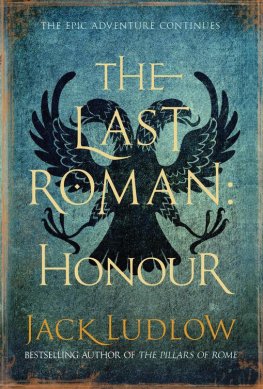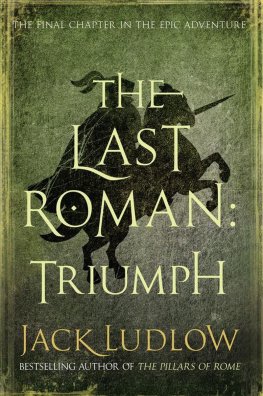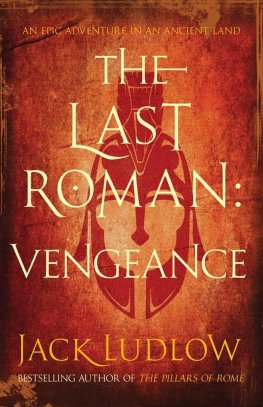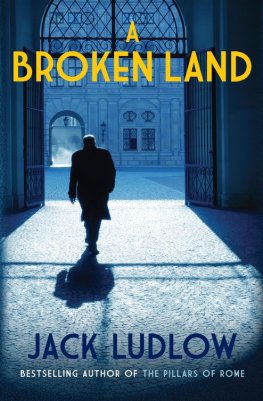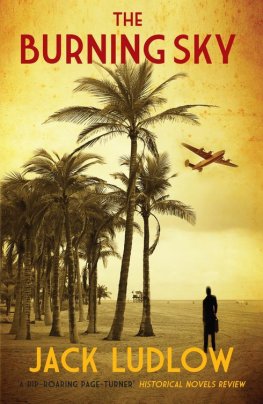Jack Ludlow - Honour
Here you can read online Jack Ludlow - Honour full text of the book (entire story) in english for free. Download pdf and epub, get meaning, cover and reviews about this ebook. year: 2015, publisher: Allison & Busby, genre: Adventure. Description of the work, (preface) as well as reviews are available. Best literature library LitArk.com created for fans of good reading and offers a wide selection of genres:
Romance novel
Science fiction
Adventure
Detective
Science
History
Home and family
Prose
Art
Politics
Computer
Non-fiction
Religion
Business
Children
Humor
Choose a favorite category and find really read worthwhile books. Enjoy immersion in the world of imagination, feel the emotions of the characters or learn something new for yourself, make an fascinating discovery.
- Book:Honour
- Author:
- Publisher:Allison & Busby
- Genre:
- Year:2015
- ISBN:9780749014414
- Rating:5 / 5
- Favourites:Add to favourites
- Your mark:
- 100
- 1
- 2
- 3
- 4
- 5
Honour: summary, description and annotation
We offer to read an annotation, description, summary or preface (depends on what the author of the book "Honour" wrote himself). If you haven't found the necessary information about the book — write in the comments, we will try to find it.
Honour — read online for free the complete book (whole text) full work
Below is the text of the book, divided by pages. System saving the place of the last page read, allows you to conveniently read the book "Honour" online for free, without having to search again every time where you left off. Put a bookmark, and you can go to the page where you finished reading at any time.
Font size:
Interval:
Bookmark:
Jack Ludlow
Honour
CHAPTER ONE
Fighting on the Persian frontier was about containment, which had frustrated Flavius Belisarius ever since he arrived. Just eighteen summers in age yet in command of a half numerus of light cavalry, he thirsted for the kind of fight in which reputations were made and deeds attained of which people would speak in decades and centuries to come: he wanted glory and with the impatience of youth he wanted it right away.
This attitude he maintained while serving alongside men who had experienced proper battle, soldiers far from happy at the prospect that conflict on a large scale might break out once more. Many had previously faced the might of the Sassanid Persian Empire and were wary of doing so again. The Romans had enjoyed little success against an enemy that generally outnumbered them and one that could rapidly gather its forces given the frontier was closer to their heartlands.
If Sassanid Persia sent forth a heterogeneous army, made up of many different tribal groups, then that too applied to the troops raised and paid for by Constantinople. Centuries had passed since Rome could field an army made up of its own citizens or indeed men recruited from within its own territories. The empire relied on mercenary barbarians to fight its battles, and given the Emperor Anastasius was a parsimonious ruler, such troops were numerically too low in the uneasy times of peace and late to arrive in proper quantities when real danger threatened.
The mainstay of the policy of containment was the great fortress at Dara, a massive effort at construction begun after the last conflict, one in which the Romans had been forced to buy a truce by paying a huge sum in gold to the Sassanid King Kavadh. Dara was a stronghold designed to ensure that no such bribes would ever be needed again but it was not a springboard for attack: likewise enterprising officers were discouraged from poking at the Sassanid hornets nest lest some small action provoke a less containable response.
It is like fighting with one arm tied behind your back.
This opinion was imparted to the eunuch Narses, the man who commanded the force of which Belisarius was a part, sent out from Dara to patrol borderlands that were porous and always under threat of raids by small bodies of tribal forces in search of easy plunder. The forward screen had seen smoke hanging in the sky, which often indicated an incursion; the fact that had still been rising suggested it might still be in progress.
Flavius Belisarius had been strongly for Narses to cross into Persian territory and cut off the raiders from their homelands so they could be properly chastised. This meant annihilated and their bones left to rot, which would serve as a warning to others. Narses, who carried the greater responsibility, while acknowledging the temptation, had demurred at this. He feared the possibility of the kind of retaliation that could get out of hand, for the imperial edicts were perfectly clear: hold our territory but do not provoke.
Thus the Romans marched straight for the column of smoke, even the cavalry, which could have ridden to seal the route of escape, so surprise was sacrificed. However engaged the raiders were in their robbery and rapine none could miss the signs of such a force marching across a dry and arid landscape, especially the clouds of dust sent up by the horses hooves.
Frustration that had been barely disguised now came near to boiling over. Narses would not release Flavius to at least get amongst the enemy as they began to retire, waiting until they were well away from the burning homesteads of a fertile valley before initiating the chase and that came with a parting command.
You know where the border is, Flavius Belisarius. The marking posts you cannot miss. Do not cross it at a peril from which your high and mighty connections will struggle to protect you.
That was maddening; worse was the quality of the unit he led. The establishment of a numerus was set at three hundred fighting men, yet there was not a unit in the imperial armies that had that as its true strength. Flavius was deficient by a full quarter of what should have been his command and, in addition, the provision of horses, the main source of mounted effectiveness, was far from perfect. Any kind of sustained and disciplined movement was constrained by the variety and fitness of what was being ridden.
Personally well mounted, nothing more than a fast canter was possible lest he wished to find himself isolated with only a rump of support; in short, most of those Flavius led could not keep up with him. So much for high connections, he thought, recalling the barbed comment of a commander keen to remind him that support in Constantinople was no guarantee of survival in the face of failure.
Such thoughts were banished as the first of the short marble pillars marking the frontier came into view. His enemies had been well enough ahead of him to get across that first and what had been headlong flight ceased; such raiders knew of the restrictions on Roman actions as well as those who laboured under them. Perhaps if they had not jeered and bared their buttocks they would not have brought on such a furious response.
Flavius slowed his mount and issued a series of shouted commands to get his men into some form of order. To those observing them, far enough inside their home territory to be safe from the best cast spear, it must have looked like a display of useless impotence and they were vocal in their ridicule. Their loud jeers were stilled as, a hundred paces from the borderline, the man who led their enemies called for the horn to be blown that initiated an advance.
The shocked raiders failed to react fast enough to secure their escape; those on horses, the leaders, who had remained mounted, fled at speed, pursued by Flavius and those of his own cavalry on horses of matching quality, some fifty in total. But most of the marauders had been on foot and, having jogged for over a league while carrying that which they had plundered, they were now too short of wind to even scatter properly before the Romans got amongst them and slaughter ensued.
Concentrating on his own quarry Flavius was not witness to what ensued. He was riding flat out, his eye on a pair of marauders who, by their richer accoutrements, in reality decorated helmets and fine cloaks, could be the leaders of the raid. He had his reins in one hand and a spear in the other, this as he shouted commands he was unsure would be heard, to get his subordinates to select a target and pursue it to the exclusion of anyone else.
None to live, was his last bellowed command.
A full gallop could not be maintained for long even on a fine animal and between his thighs Flavius could feel his horse beginning to tire. Yet if that applied to him it did so equally to those he was pursuing and the gap was closing as their mounts, harder worked by the trials of the day, visibly flagged. Always proud of his ability to cast a spear, Flavius took one of the riders ahead in the middle of his back as, raising himself from his hunched position to look over his shoulder, he presented a worthwhile target.
The way the man reared up as the spear sliced through his cloak, added to the scream that went with it, alerted his companion to the proximity of the fellow who had cast it. He too looked backwards as the mortally wounded rider alongside him slid out of his saddle to hit the ground. In doing so he obviously concluded that flight would not save him so he suddenly hauled hard on his reins and in a display of outstanding horsemanship, riding an animal that had reared up to send foaming flecks in all directions, he spun it round on its rear hooves to face the charging Roman.
The action, so sudden, caught Flavius off guard. Only by slipping a foot out of a stirrup and ducking along the outer flank of his own mount did he manage to avoid the swinging blade that would have removed his head. His assailant, sensing he was going to miss his main objective, sought to drive down with the sword in order to maim the horse, an act that removed a major portion of his mounts flying tail.
Font size:
Interval:
Bookmark:
Similar books «Honour»
Look at similar books to Honour. We have selected literature similar in name and meaning in the hope of providing readers with more options to find new, interesting, not yet read works.
Discussion, reviews of the book Honour and just readers' own opinions. Leave your comments, write what you think about the work, its meaning or the main characters. Specify what exactly you liked and what you didn't like, and why you think so.

